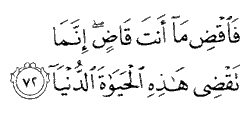When God Intervenes, Constant Anticipation, Authenticity
Issue 770 » December 27, 2013 - Safar 24, 1435
Living The Quran
When God Intervenes
Ta Ha (Ta Ha) Chapter 20: Verse 72 (partial)
 "Decree, then, whatever you are going to decree. You can only decree on what pertains to this worldly life."
"Decree, then, whatever you are going to decree. You can only decree on what pertains to this worldly life."
It was God who conducted the battle between faith and tyranny. The believers were not required to do anything other than follow the inspiration received by Moses and to move out at night. The believers were no match for the unbelievers in terms of material power. Moses and his men were weak and powerless, while Pharaoh and his army held all the material power. Hence, a battle between the two parties could not take place. Therefore, God took over, but only after the truth of faith was fully engrained in the hearts of those whose only strength was that which they derived from faith. Thus we see the tyrant delivering his threat and warning the believers of doom and the believers, with their hearts full of faith reply with the above verse.
The simple truth of the matter is that when the battle between faith and tyranny reached this level in people's hearts, God himself took up the banner of truth and hoisted it high, leaving the banner of falsehood trampled upon.
When the Children of Israel accepted the humiliation Pharaoh imposed on them, by virtue of his persecution campaign, killing their men and sparing their women, God did not interfere on their side. They simply accepted their subjugation, fearing Pharaoh and his power. But when faith was paramount in the hearts of those who believed in Moses and his message, and when they were ready to withstand the torture with their heads held high, declaring their rejection of Pharaoh and their belief in God, then God intervened and conducted the battle. Thus, victory was achieved on the battlefield as it was earlier achieved within their hearts and souls.
Compiled From:
"In The Shade of The Quran" - Sayyid Qutb, Vol. 11, pp. 431, 432
Understanding The Prophet's Life
Constant Anticipation
The Prophet Muhammad, upon him be peace, was a true man of God in both his thoughts and his behaviour, so that he took advantage of every opportunity to remember Allah, to greet Him, to express his love for Him, and to give witness to His oneness. Thus, it is related on the authority of Ibn Umar that whenever the Prophet, upon him be peace, saw the new moon he would say, 'Allah is the Greatest! O Allah, let this moon rise above us in good fortune and faith, in peace and Islam, and in success in the achievement of that which is pleasing to, and loved by You! Our Lord, and the Lord of the moon is Allah!" In another narration it is related that he would say:
'A new moon of blessings and guidance! A new moon of blessings and guidance! A new moon of blessings and guidance! I believe in Allah, the one that created you! (Three times). Praise to Allah who has taken away the month of ______ and ushered in the month of ______.'
Such is the heart of the true believer. A heart which beats in constant anticipation of the time appointed for the praising of the One who changes night into day; which awaits with optimism the coming favour of the Lord and bids farewell to favours past. Time, to such a believer, is a grant to be spent in the service of Allah. Thus, not a moment of that ephemeral quantity is spent in negligence or frivolity, but rather in prayer, in fasting, in jihad, and in unending effort to lead mankind to knowledge of their Creator.
Compiled From:
"Remembrance And Prayer" - Muhammad Al-Ghazali, pp. 127, 128
Blindspot!
Authenticity
What is authenticity? We may not know how to define it, but we certainly know it when we see it. In fact, when we are in the presence of an authentic person, many of us can even feel it in our bones. We gravitate toward people whom we perceive as honest, real and sincere. We love women who radiate warmth and that "down to earth" feeling. We gather around the people who can "tell it like it is" and laugh at themselves in the process.
Authenticity is something we revere in others and strive to maintain in our own lives. We don't feel good about half-truths, disingenuous connection and fearful silence. We all want to have a clear sense of who we are and what we believe and to feel confident enough to share that with others.
Shame often prevents us from presenting our real selves to the people around us - it sabotages our efforts to be authentic. How can we be genuine when we are desperately trying to manage and control how others perceive us? How can we be honest with people about our beliefs and, at the same time, tell them what we think they want to hear? How do we stand up for what we believe in when we are trying to make everyone around us feel comfortable so they won't get angry and put us down?
When we sacrifice authenticity in an effort to manage how we are being perceived by others, we often get caught in a dangerous and debilitating cycle: Shame, or the fear of being shamed, moves us away from our authentic selves. We tell people what they want to hear, or we don't speak out when we should. In turn, we feel shame for being dishonest, misrepresenting our beliefs or not taking an important stand.
Compiled From:
"I Thought It Was Just Me" - Brene Brown, pp. 242, 243